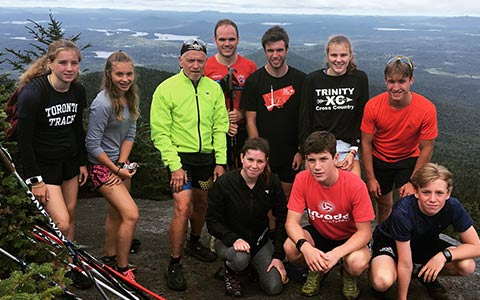by Jack Sasseville
“If you want to go fast, go alone. If you want to go far, go with a team.”

In the summer of 1979, I was hired to be the Head Women’s Team Coach for the Canadian National Ski Team. One of the first events that I attended was a testing camp held in Sudbury. As a part of the testing process the skiers on the team were given some psychological profile tests.
When the coaching staff sat down with the sport psychologist who administered the tests to discuss the general results, she said something to us that still resonates with me today. She said “You have a big problem here with these athletes. You do not have a team, but a group of individuals. These skiers have indicated that they will not do anything that would be good for the team or anyone else on the team if they did not think that it would benefit them directly as well.”
Over the first 10 – 12 years of my time with the National Team I came to accept that that was the norm for xc skiers. Born loners, most of them introverts, I thought, who really only cared for themselves and saw everyone else on the team as their opponents and competitors, not as teammates.

Many would say that this is only natural. Skiers on the National team come from various clubs and divisions, and they must fight hard to beat each other to make the NST or to qualify for a trip.
Near the end of my career with the National Team I started to think that there was a better way. A way to bring these skiers from different backgrounds together to form a cohesive team where each skier saw that the success of others on the team was a success for them, something to feel good about. The group that I had in 1991-92 came the closest to being a team.
When I moved back to Ontario in 1995, I was determined to create a club program that was based on a strong team culture. In 1996 we formed a club out of Hardwood Ski and Bike and deliberately named it “Team Hardwood” to show how strongly we felt about the concept of team.
There is, of course, much more to creating a team culture than a name. It takes a lot of work, every day, by coaches and skiers to make and maintain a great team, especially in a sport of “introverted loners”. But it can and has been done with great success by many teams, most notably the US Women’s team in last few years.

Coaches can create strong teams by understanding that they need to have control of the environment of the team when they are not competing or training. There needs to be a supportive team environment and culture in the hotel when travelling or living at home. Coaches need to have team culture meetings with their skiers where they talk about successes and failures and help the athletes to create a cohesion agreement. This agreement has to state the values, attitudes and goals of the team and what a positive team culture looks and feels like to everyone. Each year the group will be different, and you will have to revisit the agreement often and if it breaking down in any way meet again to renew it.
Athletes should understand that even though they aren’t likely to be best friends with everyone on the team they can be great teammates. By being supportive of one another they are going to get much more than they put in and the more they put in the more they are going to get back. That instead of being jealous when one of your teammates does well you will realize that by supporting others you have had a hand in their success. A win for anyone is a win for the team. It is not a zero-sum game. Another person’s success is not your failure.
How do you help others? Push each other in training. Lift others up when they are down. Understand that everyone is different and what affects you in one way could affect someone else in a totally different way. Being afraid that someone will be better than you at something will only hold you back. If someone is better at something, ask them for help and learn from them.

Leadership in a team comes in many different forms. It is everyone’s job every day to find a way to contribute leadership to the team. Skiers can support each other one on one, lead training sessions, give positive encouragement, and lift up the next generation of younger skiers by being a positive role model and spending time with them both during training and outside of training.
Each person on the team, coaches, technicians and athletes must actively choose the team over themselves every day to make a team successful. It takes self-sacrifice and a commitment not to put yourself first. Contribute to the team rather than just participate. Give more than you take. Hold your teammates accountable and be accountable to them. Ski for each other. If it is done right it will give you more to fight for and more to celebrate.
Jack Sasseville has been coaching cross country skiing for over 45 years, including 13 years with the National Team and 4 Olympic Games. Athletes Jack has coached have won over 200 medals at Canadian Championships and a silver medal at the World Junior Championships in 1989. Jack is still coaching full-time with Team Hardwood, which he founded in 1996.
Reprinted from https://www.remodic.com/ with permission of Roddy Ward (Blog owner) and Jack Sasseville (Author).